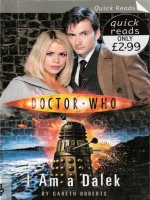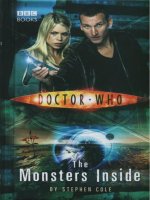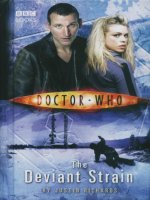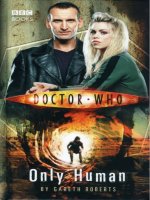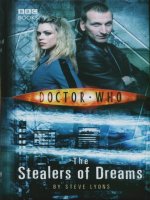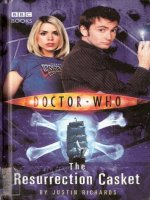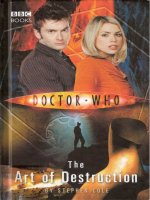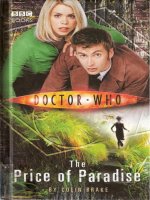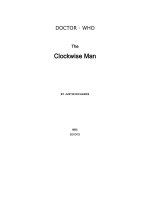Histories english 15 wooden heart (v1 0) martin day
Bạn đang xem bản rút gọn của tài liệu. Xem và tải ngay bản đầy đủ của tài liệu tại đây (729.18 KB, 178 trang )
A vast starship, seemingly deserted, is spinning slowly in the void of
deep space. Martha and the Doctor explore this drifting tomb and
discover that they may not be alone after all.
Who survived the disaster that overcame the rest of the crew? What
continues to power the vessel? And why has a stretch of wooded
countryside suddenly appeared in the middle of the craft?
As the Doctor and Martha journey through the forest, they find a
mysterious, fog-bound village – a village traumatised by missing
children and prophecies of its own destruction. . .
Featuring the Doctor and Martha as played by David Tennant
and Freema Agyeman in the hit series from BBC Television.
Wooden Heart
BY MARTIN DAY
2 4 6 8 10 9 7 5 3 1
Published in 2007 by BBC Books, an imprint of Ebury Publishing. Ebury Publishing is a
division of the Random House Group Ltd.
© Martin Day, 2007
Martin Day has asserted his right to be identified as the author of this Work in accordance with
the Copyright, Design and Patents Act 1988.
Doctor Who is a BBC Wales production for BBC One
Executive Producers: Russell T Davies and Julie Gardner
Producer: Phil Collinson
Original series broadcast on BBC Television. Format © BBC 1963. ‘Doctor Who’, ‘TARDIS’ and
the Doctor Who logo are trademarks of the British Broadcasting Corporation and are used
under licence.
All rights reserved. No part of this publication may be reproduced, stored in a retrieval system,
or transmitted in any form or by any means, electronic, mechanical, photocopying, recording
or otherwise, without the prior permission of the copyright owner.
The Random House Group Ltd Reg. No. 954009.
Addresses for companies within the Random House Group can be found at
www.randomhouse.co.uk.
A CIP catalogue record for this book is available from the British Library.
ISBN 978 1 84607 226 0
The Random House Group Ltd makes every effort to ensure that the papers used in our books
are made from trees that have been legally sourced from well-managed credibly certified
forests. Our paper procurement policy can be found at www.randomhouse.co.uk.
Creative Director: Justin Richards
Project Editor: Steve Tribe
Production Controller: Alenka Oblak
Typeset in Albertina and Deviant Strain
Cover design by Henry Steadman © BBC 2007
Printed and bound in Germany by GGP Media GmbH
Dedicated to the memory of Craig Hinton
Contents
Prologue
1
One
3
Two
9
Three
21
Four
29
Five
39
Six
51
Seven
61
Eight
73
Nine
87
Ten
99
Eleven
109
Twelve
125
Thirteen
137
Fourteen
147
Fifteen
159
Acknowledgements
169
‘He’s gone,’ said Petr in a choked whisper. ‘Just like the others. . . ’
Kristine pushed past her husband and into the room. She wanted
to see for herself.
She stared at the crumpled sheets on the bed, the pale pillow that
still bore an impression of her son’s head. It looked for all the world
as if Thorn had simply got up to get a glass of water – as if he was in
the next room and would soon return, rubbing his eyes and yawning.
Kristine rested a hand on the bed. It was warm.
‘No,’ she said at last. ‘No, this can’t be happening. Not to us. . . ’
‘Why should we be immune?’ asked Petro, He tried to place a consoling arm around Kristine’s waist, but she twisted free.
‘The bars you put across the windows, the lock on the door. . . ’
There was anger in Kristine’s voice now, an anger that her silent tears
could not soften.
‘We knew it might not make any difference,’ said Petro ‘The children
just disappear. There’s no way of protecting them.’
Kristine shook her head. ‘How can you be so accepting of it all?’
‘I’m not,’ said Petr, an awkward tone to his voice as he struggled
with his emotions. ‘But it’s like I said. Just because Thorn is the son
of the elected leader, it does not make him any less vulnerable.’
‘I don’t care about the leadership,’ said Kristine. ‘I don’t care about
the village. I just want my son back!’
‘I know,’ said Petro.
This time Kristine accepted his embrace; he wrapped his arms
around her, muffling the tears. Her entire body shook like a slender
tree caught in the wind.
Petr shook his head sadly. ‘If only this nightmare would end. . . ’
‘How many more children are going to disappear?’ asked Kristine.
‘How many more families are going to suffer?’
‘I don’t know,’ said Petro. ‘No one does.’
1
‘We should ask for help.’
‘But that is not our way,’ said Petr, grateful that his wife was too
weak to argue the point. ‘This. . . evil. . . will either resolve itself
or. . . ’
‘Or?’
‘Or we must hope for outside intervention. Some external factor,
some miracle we have not considered – but you know we cannot make
any approach ourselves.’
‘So we do nothing?’
Petr didn’t know what to say. In fact, he had tried every means at
his disposal to protect the village from the gathering threat. But it
was only now, after the evil had snatched away his own son, that he
realised how pathetic their actions had been.
Just for a moment he thought he heard a footfall behind him – the
creak of a floorboard, followed by the soft murmur of Thorn’s voice.
But he knew his mind was playing tricks on him, and he wondered if
Kristine was undergoing similar agonies.
‘We’re never going to see Thorn again,’ said Kristine in a voice so
flat and hopeless it almost broke Petr’s heart.
Petr thought of his son – such a proud, energetic child, forever
tousle-haired and impish. Would he always be like that in Petr’s
mind, trapped in his youth and unable to grow older? Petr thought of
Thorn’s strong hands, his clear eyes – his sheer force of will. And the
arguments they’d had!
Petr would give anything in the world to have one last row with his
son, just so that they could eventually come together to mumble their
embarrassed apologies to each other. Just for one last chance to say
how much he loved him.
‘We’ll see Thorn again,’ said Petr firmly. ‘Somehow. . . Somehow all
the children will come back to us.’
Kristine pulled away, a different dread in her eyes now. ‘I know,’ she
said. ‘That’s what frightens me.’
2
F
or a few moments, as Martha stepped towards the main console,
she thought she was alone.
The walls that pulsed with light, the huge support struts that
seemed hewn from living coral, the mundane latticework beneath her
feet – everything around her hummed with secrets and potential, with
the hint of amazing things as yet unseen, and with terrifying things
that were all too clear. It was like stepping into some old church
where every footstep feels like an intrusion – or finding yourself alone
in a mad scientist’s lab and wondering which bubbling experiment or
complex bit of machinery you’ll fiddle with first.
She liked these moments without the Doctor – these momentary
pauses for breath, when she had time to take it all in, to dwell on
the things she had seen, the adventures she had already had. Paths
already taken. Normal life never seemed so dull and one-dimensional
as in these brief moments of reflection.
Then again, she didn’t like having too much time to think – sometimes it was scary. These events that played out before her threatened,
on occasion, to wash her away entirely. Sometimes she just wanted
to watch a beautiful sunset on an alien world, or meet someone famous from history, without battalions of blood-sucking monsters and
3
megalomaniacal villains hoving into view.
It was probably just as well, then, that at that moment she noticed
the familiar and reassuring form of the Doctor, leaning against one
of the walls, his face partly hidden by shadows, staring intently at
the small scanner screen some feet away. He was chewing absentmindedly on one of the arms of his glasses, seemingly lost in thought
himself.
Martha circled around towards him and he looked up. ‘It’s just drifting through space,’ he said, indicating the screen with his spectacles.
‘It’s easy to think that the cosmos is full of planets and stars and stuff,
when actually. . . So much of it is empty. Bit of stray gas maybe,
echoes of dark matter and plasma, but otherwise. . . Nothing.’
Martha came round and looked at the screen. It showed, as the
Doctor said, a remarkably dark area of deep space. The velvety blackness was smudged by only a handful of distant stars. Against this
there drifted the silent form of a slowly spinning craft. Orientated
vertically, it resembled a great smooth tube of silver that thickened
into some sort of blackened propulsion system at its base. At the top
the tubular shape sprouted various spokes and protrusions.
‘Every atom’s full of space, isn’t it?’ she said. ‘Even solid things. . .
They’re not really solid. Not if you look at them close enough.’
‘The gap between electron and nucleus, the chasm between one
atom and the next. . . ’
‘What’s the ship?’ asked Martha, looking back at the screen again.
‘It’s. . . interesting,’ said the Doctor, as if that explained everything.
‘A Century-class research vessel. The Castor, if the faint mayday signals
it’s giving off are to be believed. Not built for speed, as you can see
– once it reached its destination it would hang around in orbit like a
space station. Jack-of-all-trades sort of vessel.’
‘What happened to it?’
‘Dunno,’ said the Doctor. ‘No life signs, but no signs of collision or
other damage either. I can’t tell at the moment how long it’s been
here. Days, years, decades. . . ’ Suddenly his hands moved over the
TARDIS controls in a blur. He spoke more quickly, a growing excitement evident in his voice. ‘There’s an atmosphere, though, and grav-
4
ity – now that’s odd in itself. And there’s a few other little things as
well. . . ’
‘Enough to pique your interest?’
‘Oh yes!’ he exclaimed, grinning. ‘My interest is well and truly
piqued. It’s reached a critical level of piqued-ness. If it were any more
piqued, I’d. . . ’ He slammed a few more controls home and very nearly
pirouetted on the spot. ‘I think I’d run out of pique and need a little
lie-down!’
The great engines at the heart of the TARDIS began to wheeze and
shudder.
. Are we going to take a look?’ asked Martha, wondering if the
Doctor could pick up the uncertainty in her voice. Exploring a rusting
old space station stuffed with dead bodies – or worse – didn’t exactly
sound like a barrel of laughs. ‘What am I saying?’ she realised, seeing
the Doctor’s expression. ‘Of course we’re going to take a look.’
‘So, why the Castor?’ asked Martha some moments later as they
stepped through the TARDIS doors and into darkness.
‘Good question,’ said the Doctor. He busied himself at a small panel
on the wall, illuminated only by the piercing blue glow of his sonic
screwdriver, then stepped backed triumphantly as the lights flickered
on.
‘Fiat lux!’ he said triumphantly. ‘From the Latin for My small Italian
car is on fire. . . ’
‘They’re not very bright,’ said Martha. The lights that had come on
were glowing dully, leaving pockets of shadow at regular intervals.
‘Night cycle,’ said the Doctor. He looked down the long, gently
arcing corridor they found themselves in. ‘I imagine whoever named
this craft had a love of the classics.’
‘Castor, as in Castor and Pollux – the sons of Led a,’ said Martha,
trying to elevate the conversation somewhat – and, if truth be told,
wondering if she could impress the Doctor with her learning.
‘That’s right,’ said the Doctor, peering at another panel recessed into
the wall. ‘Probably why on the colony world of Aractus they still say
Never turn your back on a swan.’
5
Martha sighed. That was the problem with the Doctor – you had no
way of working out if he was telling the truth, or deliberately escalating the conversation into the realms of the absurd. ‘I’ll remember that
next time I’m on Aractus,’ she said.
‘Castor was said to be a skilled horse tamer,’ said the Doctor,
‘whereas Pollux was a pugnacious pugilist. I wonder if that has a
bearing on this ship. People rarely just a pluck a name from the air –
it always means something. Take Martha, for example. . . ’
‘Martha means “mistress of the house”. I remember looking it up in
the library when I was a kid.’ Martha smiled. ‘Mum just said she liked
the sound of it.’
‘There could be other reasons, I suppose,’ said the Doctor. ‘There’s
a place near Peterborough called Castor. Just off the A47. . . ’
‘So you’re wondering if the owner of this spaceship was born near
Peterborough. . . ? Nothing against Peterborough, but I prefer your
first suggestion.’
‘You do?’ said the Doctor absent-mindedly as he pulled the mesh
covering the panel clean off the wall. ‘You should have heard my
third idea. . . ’
‘Which was?’
‘Whoever owned this ship was a fan of the Popeye cartoons.’
‘Sorry?’
‘Poor Popeye – hopelessly addicted to spinach and skinny women. . .
Anyway, Olive Oyl’s brother was called Castor.’
‘You’re a fount of useless information,’ said Martha.
‘Don’t you mean “useful”?’
‘I mean what I said.’ She tried to see what the Doctor was doing.
‘How come the lights are working?’ she asked.
‘Solar power,’ said the Doctor, as if that explained everything.
‘I’ve seen pictures of the space station,’ said Martha. ‘The one the
Americans and the Soviets are building. They’ve got huge solar panels, but I didn’t see anything like that on this ship.’
‘It’s integrated into the very fabric of the craft,’ said the Doctor.
‘Almost every external component and hull panel plays its part.’
6
‘But you were just telling me how empty bits of space are. This
thing might not have been anywhere near a sun for ages.’
The Doctor slipped on his glasses while peering at the panel’s small
read-out screen. ‘It’s obviously had just enough sunlight to keep it
ticking over. To be fair, it hasn’t had to expend much energy recently –
a smidge on life support, a soupcon on a few other essential systems. . .
The engines haven’t been used in years, so it’s just kind of drifted.’
‘Is that what drew you here?’ asked Martha. The mystery of it all –
a Mary Celeste that drifts in the spaces between the stars. . . ’
The Doctor took a step back, suddenly serious. ‘It reminds me
of another ship, a craft with a link to a person from the history of
your planet. . . ’ He trailed away, his eyes intense, as if he could stare
through the metal hull of the craft and see the stars and nebulae beyond.
‘The Pollux?’ suggested Martha hopefully.
‘Never mind the Pollux,’ said the Doctor abruptly, replacing what
was left of the panel’s outer covering. ‘It’s this vessel that fascinates
me now. What happened here?’
He began to stride down the corridor; big, confident steps. Steps
that wanted to march into the future, to turn corners, to find out what
happened next – and to revel in it.
Martha chided herself for downplaying this particular trip in the
TARDIS – she’d forgotten that, with the Doctor at your side, words
like ‘mundane’ and ‘everyday’ just didn’t seem to count.
‘Probably just a systems malfunction,’ offered Martha helpfully.
‘There’s no sign of any great systems failure in the central computer
system,’ said the Doctor. ‘But perhaps it just healed itself. Stranger
things have happened.’
Martha drew a long breath. ‘If you say so.’
‘Ah,’ said the Doctor. ‘This looks interesting.’
The corridor terminated at a circular door about three metres in
diameter. It looked like a resolutely closed metal iris, and horizontal
bars extended from the walls on either side and through large metal
loops to give an even greater impression of solidity.
7
‘To keep something out, or to lock something in?’ wondered Martha
out loud.
‘My thoughts exactly,’ said the Doctor. A quick wave of the sonic
screwdriver and the bars retracted into the walls, leaving behind a
faint smell of ozone and grease. Then the main door blossomed open.
‘Hello!’ the Doctor called as he stepped through. ‘Anyone home?’
‘You sure there’s no one on board?’ said Martha. ‘Little bit of courtesy goes a long way, you know.’
‘The TARDIS didn’t pick up any life signs,’ said the Doctor. ‘As long
as the life forms in question aren’t hidden behind some sort of electromagnetic shield. . . Or out of phase. . . ’
His voice dwindled to nothing as they found themselves on a high
gantry, a circular walkway that had fifty or more doors leading away
from it. Three metres above them was another walkway, and another;
Martha risked a glimpse over the edge of the handrail, and the tubular structure they found themselves in seemed to disappear in both
directions almost out of sight.
Martha took a step back from the edge. ‘This place is huge.’
‘It is,’ agreed the Doctor. ‘Any other thoughts?’
‘It’s very utilitarian,’ said Martha.
The Doctor nodded. ‘We know this is a research vessel and not a
hotel, but even so. . . It’s not at all what I was expecting.’ He pointed
to the identical doors, evenly spaced along this and all the other walkways. Each had a tiny observation window at head height. ‘Remind
you of anything?’ he asked.
‘A prison,’ said Martha suddenly. ‘It’s like a huge prison.’
‘I was worried you were going to say that,’ said the Doctor, walking
past Martha to the first door. He waved his sonic screwdriver over the
control panel at the side of the cell. ‘Shall we take a look?’
8
T
he door hummed open, a momentary interruption to the thick silence that gripped the vast chamber.
Martha paused, not sure what to expect. If you’ve encountered
rhino-headed storm troopers and witches on broomsticks, she reasoned, you’ve got to keep your options open.
Nothing happened – nothing beyond a slight tingling sensation on
her skin, as if the air in the cell, maintained for so long at a certain
temperature and pressure, was now being released.
The Doctor stepped into the small room. ‘It’s perfectly safe,’ he
announced, though there was an ambiguity in his voice that did not
inspire confidence.
When Martha followed him inside she understood the Doctor’s uncertain tone.
The small area was no bigger than the box room at the front of the
house where Martha had spent so much of her childhood. In the cell
were a bed, a folding desk and a single cupboard high up in the corner
of one of the walls. There was a screen at the far end of the room:
whatever its original function, it resembled a dark, oversized tile as
no power went to it now.
9
A few indeterminate items of clothing were scattered on the floor. A
thick layer of dust had fallen on the desk and the pens and other items
that cluttered its surface. ‘No air filtration in here,’ Martha observed
in a whisper, remembering the pristine corridor they had landed in.
‘No,’ said the Doctor, his own voice a funereal whisper. ‘Not a high
enough priority, I suppose.’
Martha reached out to run her finger across the desk, then remembered that household dust was largely composed of shed human skin.
She shivered, staring intently at the object of the Doctor’s curiosity,
for lying in the bunk, curled as if sleeping, was the long-dead body of
a man, tatters of bleached-grey overall still clinging to his limbs.
‘How long has he been dead?’ she asked, appalled but unable to
avert her gaze from the cracked, shrivelled skin.
The Doctor popped his glasses back on his nose, dropping his head
to look more closely at the dead man than even Martha, with all her
medical training to back her up, would have been comfortable with.
‘What with the somewhat garbled information I was able to glean
from the central computer, and given the obvious age of his body. . . ’
He paused. ‘Whatever happened on this craft, it all took place at least
a hundred years ago.’
‘A hundred years?’
‘Yeah, give or take. The artificial atmosphere means the corpse has
become. . . sort of mummified. The outer few layers of the epidermis
have gone’ – Martha glanced at the dust again and a shiver went down
her spine – ‘but the rest of the body has just. . . dried out.’
The Doctor turned to look at Martha, his body language reassuring
despite his words and the environment they found themselves in.
‘So sad,’ he added, quietly.
‘Any idea what killed him?’ Martha asked, opening up the cupboard
but finding only two small porcelain figures and a thick paperback
book.
‘Dunno,’ said the Doctor, slipping his glasses into a pocket. ‘How do
you fancy putting your training in pathology to the test?’
‘Not absolutely number one on my list of things to do in the next
five minutes,’ said Martha.
10
‘So perhaps we’d better find another way. Less. . . invasive.’ He
turned for the door. ‘What was the book in the cupboard, by the
way?’
‘Freud’s Interpretations of Dreams,’ said Martha, pleased to be following him out of the room.
The Doctor nodded, then pointed to the control panel set into the
doorway. ‘You can only open the cell doors from outside,’ he said.
‘This part of the ship. . . It’s definitely a prison.’
‘What would a prison be doing on a research vessel?’ asked Martha.
‘Depends what it’s researching.’ His voice became deadly serious.
‘But I think we just found our first guinea pig.’
They stood for a moment on the circular gantry, Martha marvelling at
the sheer size of the place. On the TARDIS scanners it was hard to get
a sense of scale just by looking at something against the backdrop of
space. As a result she’d been expecting something grim and claustrophobic, like the Russian-American space station she had mentioned to
the Doctor. The reality, however, was a vast expanse of endless alloy
and open space.
Mind you, the cell had been grim and claustrophobic – the prisoners
here, if that’s what they were, certainly hadn’t been living the life of
Riley.
She turned to the Doctor, still thinking of the few items she’d found
in the cupboard. ‘I’m surprised that people in the future still have
books,’ she said. ‘The way technology advances, I thought you’d. . .
Plug yourself into a computer and download stuff straight into your
brain.’
‘Even when something new and flashy comes along,’ observed the
Doctor, ‘the old forms persist. You should see my record collection!
Can’t beat a good bit of vinyl.’ He started to make his way to the next
cell along. ‘Anyway,’ he continued, ‘what could be more practical than
a real, old book made from real, old bits of paper? You can read it in
bed, on a bus, in the bath even. You try doing that with a PDA when
the batteries are flat!’ He held the sonic screwdriver over the door,
glancing at Martha. ‘Ready?’
11
She nodded, and he waved his hand over the keypad like a magician with a wand. A glow of light, a briefly oscillating noise as the
screwdriver doubtless tried every possible combination under the sun,
and then the door hissed open.
The room beyond was almost identical to the first. The final pose
of the body it contained couldn’t have been more different, however.
If the first prisoner they had stumbled across had perhaps died in his
sleep, this one had pushed himself into the corner of the room and
pulled his knees up to his chest. Though slumped now, Martha could
imagine the arms being coiled tightly over his ears and eyes, trying to
block out. . . What?
She shivered. ‘Any signs of trauma?’ she asked.
The Doctor leant forward. ‘No. . . Nothing obvious.’
‘The life support must have failed.’
‘But the computer says life support’s been ticking over with barely
a problem since it first came into service.’
They tried the next cell, and the next, and the next. Each contained
a body, shrivelled by the unique atmospherics of the craft. It was not
obvious why any of them had died. The Doctor and Martha checked a
few more, finding yet more corpses, some apparently sleeping, some
apparently frozen as if in flight from an unseen terror. None, of course,
could escape, for each cell had remained resolutely locked. As the
Doctor observed, the entire place seemed ruthlessly efficient – it was
a testament to human ingenuity that it was all still working after so
long.
‘I don’t think we’re going to find anything more here,’ said the Doctor.
Martha was relieved – she didn’t much fancy spending the rest of
the day checking the other cells. There were hundreds of them, and
there was no reason to expect that any of them would be any different
from those they had already examined.
‘We need to find the technical area,’ said the Doctor. ‘There’s a limit
to what the computer systems I can hack into from here can tell me.’
Martha risked a glance over her shoulder as she walked. ‘All these
prisoners. . . Were they criminals or political activists or captured sol-
12
diers or. . . ?’
‘Yeah, that’s one of the questions I’m keen to answer,’ said the Doctor. ‘If we can –’
He stopped suddenly, Martha almost running into the back of him.
‘Did you hear that?’ he whispered, his head darting from side to
side.
‘What?’ Martha hissed, suddenly more on edge. The only thing
worse than exploring a mausoleum full of bodies was the idea that
someone or something in there wasn’t quite dead yet.
‘I thought I heard something,’ said the Doctor. He paused for a
moment, then carried on walking, head held high, as if nothing was
the matter. ‘Oh, well, not to worry,’ he said loudly.
‘Not to worry?’
‘This place has been shut up for a hundred years,’ he continued. ‘No
movements, no disturbances – and then we come along, breathing in
the air, opening doors, generally making a nuisance of ourselves. . . ’
‘Speak for yourself,’ said Martha.
‘Plenty of creaks and groans, but absolutely nothing to worry about!’
He grinned brightly, and just for a moment Martha was taken in by
his broad smile – the sort of innocent grin that, on Earth, usually went
with scraped knees and Sorry, miss, my mate’s just hoofed our football
over your garden wall, you don’t mind if we go and get it, do you. . . ?
Then she noticed that she couldn’t see one of the Doctor’s hands.
‘You’ve got your fingers crossed behind your back, haven’t you?’
The Doctor was immediately on the defensive. ‘Who, me? Fingers
crossed? Nah, never!’
Only moments later did his left hand emerge to start inputting the
correct settings on the sonic screwdriver.
Beyond the second irised door the Doctor and Martha found a much
more high-tech series of corridors and rooms. The night-time lighting illuminated myriad machines and a bewildering array of desks,
workstations and control panels.
‘This is more like it!’ exclaimed the Doctor.
13
They found yet more corpses, just as hideous as those they’d previously encountered, but some wore security uniforms, while others
were in long white coats. ‘Scientists?’ speculated Martha. ‘You said
they were researching something here.’
‘And hired muscle,’ said the Doctor, bending over the body of one
particular guard, frozen in position over a bank of computer screens.
A quick glance and you could almost imagine he was still doing his
job, still watching the security camera images for the slightest signs of
trouble. The monitors, though, had long since powered off.
The Doctor waved his hands over what appeared to be some sort
of keyboard made of thick fibre optic strands. ‘One thing you can say
about the people of your future, Martha. . . Is that they’ve long since
abandoned screensavers. . . This monitor will go into complete hibernation if it doesn’t detect any movement – and I’m talking blinking
eyes, scratching your head, that sort of thing. Very green, and it stops
the guards from falling asleep on the job.’
‘But that’s exactly what seems to have happened, isn’t it?’ said
Martha. ‘It’s like everyone just fell asleep.’
‘Hmm. . . ’ The Doctor didn’t sound convinced.
The screen, as if it resented the intrusion after all these years of
slumber, finally sprang into life. Martha noticed that others stretched
along the long panel in front of them were also beginning to glow.
Everyone showed a section of the multi-level prison area they had
just been in; the view cycled from one hidden camera to another, and
it was only the subtleties of light and shade that made each snapshot
different from the last. Being a guard on this ship, reflected Martha,
must have been dull in the extreme.
Before the Doctor could say anything, the lights in the room – mere
glowing pinpricks against the flat, dull ceiling – became gradually
brighter. The room moved from a subtle sense of autumnal night
to the artificial cold-blue harshness of a working day. A quick glance
at the images on the monitors, and into the corridor behind them,
revealed the truth. It was as if the Doctor and Martha had intruded
into some magical, slumbering kingdom, which all around them was
beginning to wake.
14
‘What have you done?’ Martha blurted out, surprised at her own
reaction. She would have expected to have welcomed the light and
brightness, but, surrounded as she was by hundred-year-old corpses,
everything seemed even more grotesque now. It just seemed wrong
somehow, like stumbling into a funeral with hats and party poppers.
‘The daylight cycle’s kicked in,’ said the Doctor. ‘Nothing to do with
me. Honest.’
Even so, Martha found herself glancing over her shoulder to make
sure that they were still alone.
‘Now we’re cooking with gas!’ exclaimed the Doctor, settling
down at an unoccupied console, his hands blurring over the controls.
Martha watched him for a moment, but he seemed now only to be
conversing with himself, muttering occasionally and sighing.
Martha turned away, feeling both lost and useless in this futuristic
environment. ‘This is the point,’ the Doctor suddenly whispered, without looking up, ‘where curiosity usually gets the better of people. It
has been known for my friends to go for a wander, get lost, or stumble
upon something quite unexpected. . . ’
‘Go for a walk around here?’ scoffed Martha. ‘Are you serious?’
She strolled over to another console – at least this room seemed safe
enough. ‘You know, I think I’ll take you to Kensal Green cemetery if we
ever get back to London,’ she said, warming to her theme. ‘Consider
it. . . repayment in kind.’
‘Oh, I love cemeteries!’ exclaimed the Doctor happily.
‘You would,’ muttered Martha, just quietly enough for the Doctor
not to hear.
‘Isn’t Brunel buried there? And Thackeray – I told him to paint
those pillar boxes red, you know. He really wanted them in yellow!
And Oscar Wilde’s dear old mum.’
‘Doctor. . . ’
‘Oh, and Charles Blondin, of course! Do you know, when he took me
across the Niagara Falls in that wheelbarrow, well, for once, I feared
for my life. . . ’
‘Doctor!’
‘Hmm?’ the Doctor looked up from his screen.
15
‘There’s something you should see,’ said Martha, wondering if he
could detect the fear in her voice.
Within a moment he was at her side. ‘What is it?’
Martha pointed at the display in front of her. Something had caught
her eye – and it made her blood run cold. ‘I thought you said there
were no life signs on this ship.’
‘No, there weren’t – though, if you remember, I did add certain
caveats, a few qualifications. . . ’
‘Well,’ said Martha, tapping the screen for emphasis, ‘we’re certainly
not on our own any more.’
‘Ah,’ said the Doctor slowly. He stared at the monitor, turned his
head away, and then looked back at the information – as if checking
he wasn’t mistaken. The readings were still there.
‘Ah,’ said the Doctor again.
‘Ah?’
‘Definitely,’ he said. He glanced at Martha. ‘Doesn’t make sense,
does it?’
‘Phew,’ said Martha. ‘I thought it was just me.’
The monitor showed a map of the Castor, each level, room and wing
picked out in fine detail. Coloured dots marked the presence of life
on the ship. ‘There’s us,’ said the Doctor, indicating two strands of
information scrolling across the screen. ‘One human, one unknown –
how rude! It says we’re both standing in Security Room B, that we’re
both physically fit, and. . . Oh, bad luck, Martha!’
‘What?’
‘Says you’re developing an ear infection. Something to watch out
for. Or listen out for maybe.’
‘Honestly, I feel fine,’ said Martha.
‘Computer says No,’ said the Doctor. ‘And we can’t argue with this
fine piece of hardware, can we? Not when it has just detected these
other signs of life. . . ’
He stabbed at two other dots with strips of information scrolling off
them. One strand seemed awash with information, and one barely
seemed to register at all. Indeed, as she peered still more closely, the
fourth data stream blinked out completely.
16
‘Look!’ she said. ‘It’s gone.’
‘And then there were three,’ said the Doctor gravely. ‘Well, I say
three, but this other life sign. . . It’s like trying to isolate a footballer’s
broken leg by taking an X-ray of the entire team. Just too much data,
all in one go! The system is struggling to isolate any meaningful information.’
‘And the one that’s just disappeared?’
‘The exact opposite – no real data worth gathering. No heat, no
energy, no movement. . . Oh, look, it’s come back again!’
The fourth dot appeared again, flickering like a torch running on
old batteries.
‘You reckon you can work out where on the ship these. . . life forms
are?’ asked Martha.
‘Absolutely! That big splurge of info shouldn’t be too hard to keep
an eye on. Not so sure about the other fella, though – more like
a shadow than a real creature at all.’ His voice became a whisper.
‘Between the idea and the reality. . . Falls the shadow.’
‘Then let’s find out where the big one’s coming from,’ said Martha.
The Doctor pressed a few buttons, whistling under his breath. ‘Just
look at the energy that creature’s pumping out!’ he exclaimed moments later. ‘Hook him, her or it up to the national grid and you could
power Milton Keynes for a week!’
‘Why Milton Keynes?’
‘Why not Milton Keynes?’ said the Doctor. ‘You know, whenever a
chunk of the Amazon rainforest disappears, it’s always a piece of land
the size of Wales. Or Belgium. What have they ever done to anyone?’
He found a pen in an inside pocket and scribbled some coordinates on
the back of his hand. ‘Bad news,’ he said as he did so.
‘What is?’
‘This big life sign the computer’s picked up. . . ’ He sighed. ‘It’s
between us and the TARDIS.’
The Doctor and Martha left the security room only after checking all
the available monitors. There didn’t seem to be any cameras trained
on the spot the Doctor had identified – the fourth reading having
17

